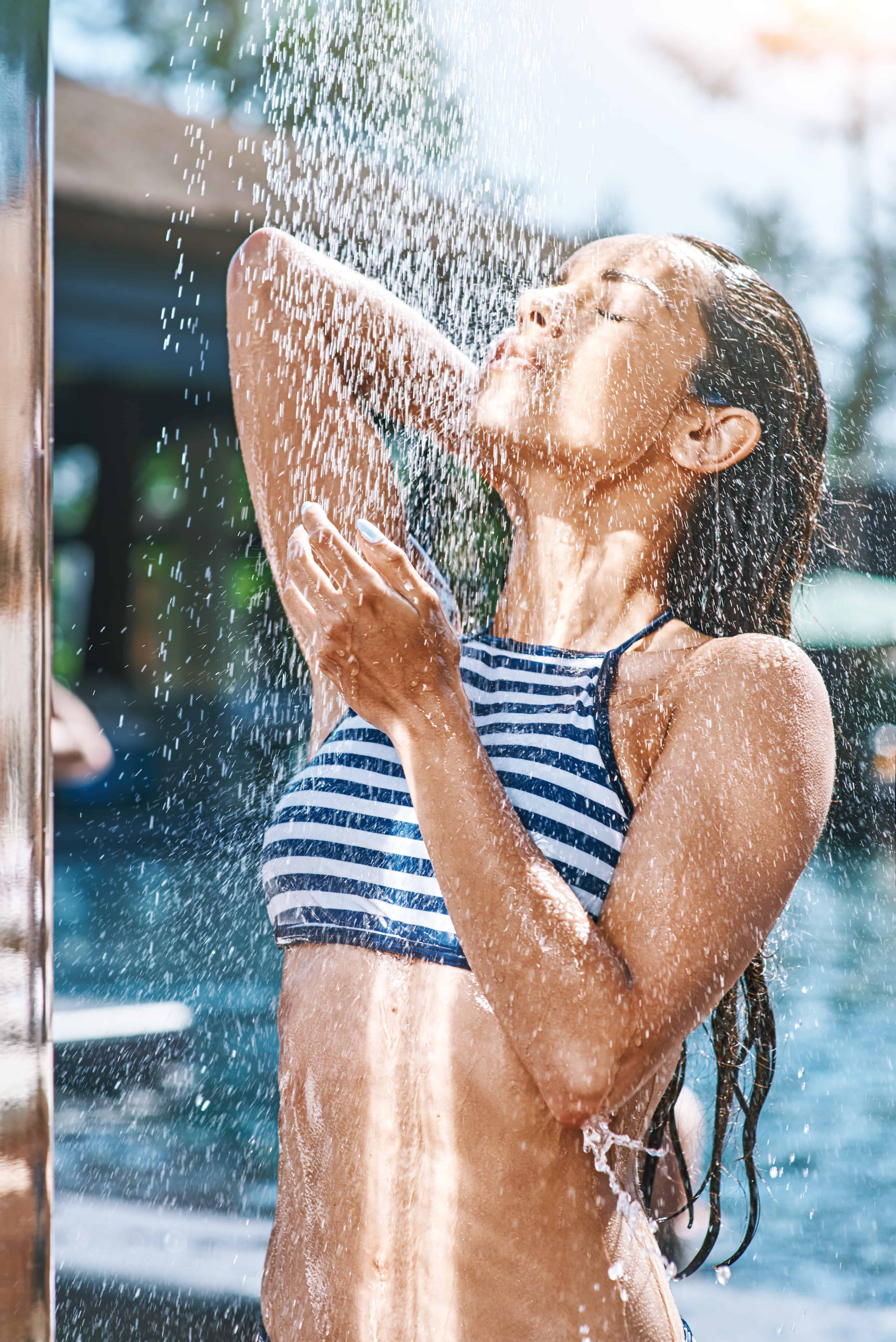Whether or not to have a shower before jumping into a salt water pool is a question bathers ask. Certainly many public pools request that swimmers have a quick shower before entering any pool.
But what about having a shower after swimming, particularly to wash chlorine off your skin and swimming clothing?
Showering with soap after swimming in a salt water pool helps to remove chlorine and other pool chemicals which can benefit your skin and prevent tracking contaminants into your home. Showering before entering a salt water pool is also a good idea to reduce contaminants on your skin which are brought into the water which can increase chlorine requirements.
Here are some additional thoughts regarding showering before and after swimming in your salt water pool as well as some facts regarding chlorination and how it kills contaminants.
Is it bad to not take a shower after swimming in chlorine?
Showering after swimming in any body of water is a smart idea and a chlorinated pool is no different.
If you have sensitive skin, showering with soap after swimming is great idea in order to wash the chlorine and other chemicals off your skin.
Remember: A salt water pool is a chlorinated pool. Salt water pools have chlorine just like regular old-school pools. The difference is that the chlorine is manufactured by your chlorinator rather than being added manually.
Salt water pools also contain other chemicals such as stabilizer (cyanuric acid) as well as algaecide, muriatic acid, filter cleaner and any other chemicals you’ve recently added as part of regular pool maintenance and upkeep.
While it may not be otherwise noticeable to you, showering after swimming in any chlorinated pool is a good idea if only to clean off any chemicals in the water that made their way onto your body while you were in the water.
Of course, bodies of water including pools also have other contaminants in them as we’ll see below and showering after you’ve been swimming is also a great idea.
Should you shower with soap after swimming?
While showering after swimming in your salt water pool can help to remove chlorine and other pool chemicals from your skin and body, it can also help to remove contaminants in the pool water itself that made their way onto your body while you were in the water.
Again, salt water pools are chlorinated and washing your hair and body with soap afterwards removes any remnants of the chlorine. People associate the chlorine smell with pools and because salt water pools generally don’t give off that strong scent, you may forgot that the water is even chlorinated.
The reason why we need chlorine in our pools is to neutralize contaminants that enter the water either from us swimming in it or by other external factors such as vegetation, animals, wind and rain. These contaminants can end up on our skin, in our hair and on our swimming clothes and towels so bathing after swimming ensures we get rid of them.
It’s best to shower after you’re done swimming for the day so when you put pajamas on and get into bed, you’re not tracking contaminants in with you.
Should you shower with soap before swimming?
Showering with soap before swimming in your salt water pool is also a good idea especially if you haven’t had a shower earlier that day. Here’s why:
When you enter the pool, you may have a number of contaminants on your body and clothing that will make their way into the water, namely:
- Sweat
- Dirt
- Dead skin
- Saliva
- Urine
- Feces
- Bodily oils
- Deodorant
- Cosmetics
- Sunblock
- Cologne or perfume
- Hair
among others.
The more of these you can wash off prior to entering the water, the less contaminants you bring into the pool and the lower your chlorine requirements will be moving forward. Every time you bring a contaminant into your pool, it increases the need for chlorine to neutralize or otherwise deal with it.
Other contaminants find their way into your salt water pool
Depending on your local conditions, your salt water pool can find itself dealing with a wide variety of other non-human contaminants such as:
- Bird droppings
- Dead rodents
- Rotting twigs, leaves and other dead vegetation
- Algae
- Soil
and more.
Although chlorine is expected to “kill” or otherwise neutralize these contaminants, chlorine doesn’t necessarily do so immediately. While free chlorine can kill some contaminants on contact or within 60 seconds, other common parasites may not be neutralized for 15 minutes or longer.
Summary
Showering with soap after swimming in your salt water pool is a good way to ensure you wash off any contaminants on your skin and don’t track them into your home, onto your pajamas and into your bed when you retire for the evening.
Showering before your swim in your salt water pool is also a smart idea since it reduces the chance you track contaminants on your body into the pool, too. The more contaminants you bring into your salt water pool, the greater your chlorine requirements.
After showering, you can always moisturize if you’re worried about your skin drying out, due to the chlorinated water and extra showering.

